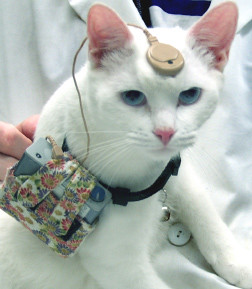Most of us are used to our cats ignoring us. We try and try to get their attention, but they are too busy staring off into space or licking their paw to give us the time of day. Is kitty preoccupied with the art of zen or is Mr.Fluffypants just hard of hearing?
Believe it or not, it's not terribly uncommon for cats to lose their hearing, just like humans. In fact, they can get along just fine without it, but it does present interesting challenges for those of us who care for their special needs.
In addition to the usual causes of deafness, most people don't realize that a cats’ coloring often plays a huge role in the degree of hearing loss. Studies show that about 65% of white cats who have two blue eyes are deaf in one or both ears. White cats with just one blue eye have a 40% chance of being deaf, and white cats without blue eyes are deaf, or partially so at a rate of around 20%.
Our very own Snowpea, is the exception to the rule, being deaf in both ears with yellow eyes. Snowpea is a kitten with a very challenging life ahead of her. We are hoping to set the pace for a successful match with the right person who can care for her.
Whether the hearing loss is sudden or gradual, behavioral changes may alert the guardian to the possibility of deafness. The kitties compensate so well in many cases, that it may be a very long time before the hearing loss is noticed, particularly if it is a gradual loss. Hearing impairment can cause any kitty to become irritable, confused, easily frightened, skittish, and insecure. Since they can’t hear their own voice, cats may vocalize loudly and often. In some cases the hearing impaired cat may become mute.
In the case of Snowpea, she tends to get lost in her own world, sleeping most of the day, unless there are fun activities, playful interludes with people or the distractions that can only be provided by another cat.
Deciding whether or not a deaf kitty is better off as a single pet is difficult. While some cats will take behavior “cues” from other resident cats or litter mates, some will not. Some deaf kittens will play fight more aggressively, and swat and bite more because they cannot hear the cries of the other kittens. Deaf cats living with hearing cats and/or dogs may become the “victim” of surprise play attacks, and over-react causing friction in a multi animal household. In this stalking type of situation the deaf kitty may redirect his or her aggression toward the humans in the household. All in all, a deaf cat will probably do best as a single pet or with another kitty he or she has known all their life.
So here lies our dilemma: At the tender age of 4 months, we have to decide if Snowpea will be the target of sneak attacks or the ruler of the roost. I guess it's all a matter of who shows interest. The time is NOW to make this decision!
If you are thinking about adopting Snowpea or a deaf cat in another shelter, remember the following:
Hearing impaired cats will do best with routine handling and an out pour of love. I know, what a hassle right? Cuddling them close to the human’s body and speaking will possibly allow them to “hear” your voice through vibrations. You may even experience a closer relationship with your cat as a result of all of this body to body interaction.Hand signals similar to the ones used in dog training may be effective with some cats while others may not rely on it as much. If you are at close range and clap your hands sharply, the air might vibrate enough to attract their attention. Some people have noticed that their deaf kitties learn to respond to lights being turned on and off as signals that someone is entering a room, etc. Maybe a laser pointer will help to signal your arrival or dinner time? You will surprised how resourceful a cat can be when dinner is served. The ears may not work but the nose never breaks!
Adopting one of these “special needs” kitties is totally a rewarding and admirable responsibility to take on, as long as you are aware that it will require a bit of extra work. These cats cannot be allowed outdoors as they would be unaware of the dangers around them and fall prey to a myriad of hazards. If you're the type of person who can learn to predict a cats behavior while being a predictable schedule planner at the same time, you may just be the personal assistant a deaf cat needs. Interested in the job? Call the San Francisco SPCA at 415 522-3500 and ask about Snowpea!






No comments:
Post a Comment